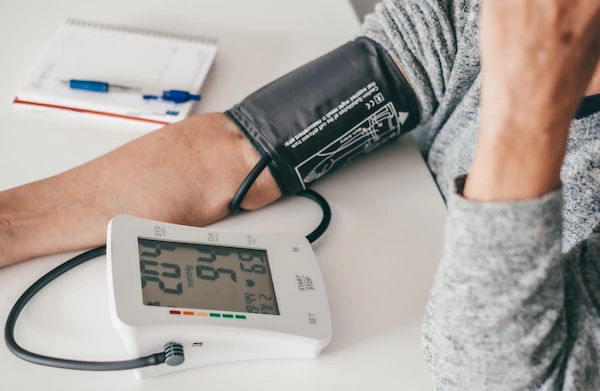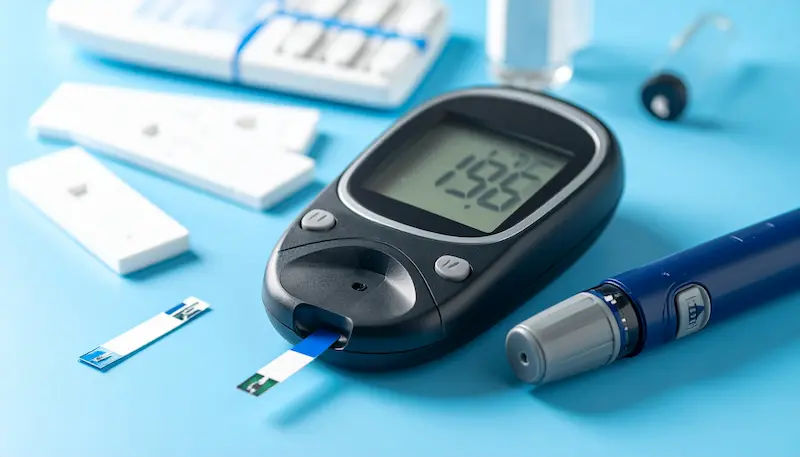Blood Pressure and Its Effects on Your Brain: A Complete Guide
Explore how blood pressure impacts brain health, the risks of hypertension, and steps to protect your cognitive well-being.


Introduction
Your brain is the command centre of your body, a remarkably complex organ that depends on a constant, rich supply of oxygen and nutrients to function correctly. This vital delivery service is powered by your heartbeat, which pushes blood through an intricate network of vessels directly to your brain. The force of this blood flow is your blood pressure, and keeping it within a healthy range is arguably one of the most critical things you can do for your long-term brain health. When this pressure is too high or too low, it can have profound and sometimes silent consequences, from affecting daily focus to increasing the risk of devastating conditions like stroke and dementia. This guide will demystify the crucial connection between your blood pressure and your brain, exploring the risks, warning signs, and, most importantly, the powerful steps you can take to protect your cognitive vitality for years to come.
The Vital Connection: Your Heart and Your Brain
Think of your heart and brain as partners in a delicate, lifelong dance. The heart's pumping action creates the pressure that drives blood upward against gravity to the brain. This isn't just a passive pipework system; it's a dynamic, tightly regulated process designed to ensure the brain gets exactly what it needs, moment by moment.
Understanding Cerebral Blood Flow
The brain, despite being only about 2% of body weight, receives roughly 20% of the body's total blood output. This immense demand highlights its metabolic activity. This constant circulation, known as cerebral blood flow, delivers essential glucose and oxygen while removing waste products like beta-amyloid plaques, which are associated with Alzheimer's disease.
The Role of Cerebral Autoregulation
To manage this, the brain has a brilliant built-in mechanism called cerebral autoregulation. It allows the brain's blood vessels to widen or constrict in response to changes in systemic blood pressure, ensuring a steady flow regardless of whether you're standing up quickly (which can cause a temporary drop in BP) or exercising (which raises it). However, chronically high blood pressure can damage and stiffen these vessels, impairing this autoregulation system and leaving the brain vulnerable to damage from pressure swings.
Consult a Neurologist for the best advice
The Dangers of High Blood Pressure (Hypertension)
Hypertension is often called the "silent killer" because it typically has no symptoms until significant damage has already occurred. For the brain, this silent assault can have several devastating outcomes.
How Hypertension Damages Brain Blood Vessels
Consistently high force of blood coursing through the brain's delicate arteries causes them to thicken, harden, and become narrow, a condition known as arteriosclerosis. This makes them less flexible and more prone to blockages or ruptures. Tiny, weak spots can also form (microaneurysms), which may burst and cause small, often undetected bleeds.
Stroke and Transient Ischemic Attack (TIA)
This vessel damage is the primary cause of stroke. An ischemic stroke occurs when a clot blocks a narrowed artery, starving brain cells of oxygen. A hemorrhagic stroke happens when a weakened vessel ruptures and bleeds into the brain tissue. A TIA, or "mini-stroke," is a temporary blockage with stroke-like symptoms that typically resolve within 24 hours. It is a major warning sign that a full-blown stroke is imminent and requires immediate medical attention.
Hypertension's Link to Dementia and Cognitive Decline
Perhaps the most insidious effect of high blood pressure is its slow, cumulative impact on cognition.
- Vascular Dementia: This is the second most common type of dementia after Alzheimer's. It results from reduced blood flow to the brain, often due to multiple tiny, silent strokes that damage crucial neural pathways. This leads to problems with reasoning, planning, judgment, and memory.
- Alzheimer's Disease: Research increasingly shows a strong link between hypertension and Alzheimer's. Impaired blood flow hinders the brain's ability to clear away toxic beta-amyloid proteins, allowing them to accumulate and form the plaques that characterise the disease. This suggests that managing blood pressure could be a key preventive strategy against Alzheimer's Disease.
The Often-Overlooked Risks of Low Blood Pressure (Hypotension)
While less common, persistently low blood pressure (hypotension) can also affect the brain. If pressure is too low, the heart may not be able to pump enough blood to the brain, especially when moving from sitting to standing (orthostatic hypotension).
Dizziness, Falls, and Reduced Blood Flow
This can cause dizziness, lightheadedness, blurry vision, and even fainting. For older adults, this significantly increases the risk of falls and injuries. Chronically low flow may also lead to a persistent brain fog, fatigue, and difficulty concentrating, as the brain is consistently under-fueled.
Key Strategies to Protect Your Brain by Managing Blood Pressure
The excellent news is that you have immense power to influence this relationship. Protecting your brain health is directly tied to managing your blood pressure.
Dietary Approaches: The MIND and DASH Diets
The MIND diet (Mediterranean-DASH Intervention for Neurodegenerative Delay) is specifically designed for brain health. It combines elements of the DASH diet (Dietary Approaches to Stop Hypertension) and the Mediterranean diet. It emphasises leafy greens, berries, nuts, whole grains, and fish, all rich in nutrients that support vascular health and reduce inflammation.
The Importance of Regular Exercise
Aerobic exercise (e.g., brisk walking, swimming, cycling) for at least 150 minutes per week is a cornerstone of blood pressure management. It strengthens the heart, allowing it to pump blood more efficiently with less effort, which reduces the force on your arteries. Exercise also boosts blood flow to the brain directly during activity.
Stress Management and Quality Sleep
Chronic stress keeps your body in a fight-or-flight mode, elevating cortisol and blood pressure. Practices like meditation, deep breathing, and yoga can dampen this response. Furthermore, aim for 7-9 hours of quality sleep per night. Sleep is when the brain performs essential housekeeping, including clearing out metabolic waste. Poor sleep is linked to higher blood pressure and an increased risk of cognitive decline.
Monitoring and When to Seek Help
Knowledge is power. How to accurately monitor your blood pressure at home is a crucial skill. Use a validated, automatic, upper-arm cuff. Take readings at the same time each day, in a quiet setting, after resting for 5 minutes. Keep a log to share with your doctor.
If your readings are consistently high (typically above 130/80 mmHg, but confirm target goals with your doctor), or if you experience symptoms like severe headaches, chest pain, shortness of breath, or sudden vision changes, seek medical advice promptly.
Conclusion
The link between blood pressure and brain health is undeniable and profound. It's a relationship that operates silently in the background, making proactive management essential. By understanding the risks of both hypertension and hypotension, you can take empowered steps to safeguard your cognitive function. Embracing a brain-healthy lifestyle isn't just about adding years to your life; it's about adding life to your years, preserving your memory, your clarity, and your independence. Start today by monitoring your numbers, nourishing your body with the right foods, staying active, and prioritising rest. Your brain, the most incredible organ you possess, will thank you for decades to come.
Consult a Neurologist for the best advice
Consult a Neurologist for the best advice

Dr. Aditendraditya Singh Bhati
Neurosurgeon
21 Years • MBBS(2004), DNB Neurosurgery(2014); MNAMS; Fellow Skull Base Endoscopy (Italy), Fellow Extended Skull Base ( Weill Cornell, USA), Fellow ZAP-X Radiosurgery. Member of American Association of Neurological Surgeons
Delhi
Apollo Hospitals Indraprastha, Delhi
(100+ Patients)

Dr. Ganeshgouda Majigoudra
Neurologist
10 Years • MBBS, MD ( GENERAL MEDICINE) DM (NEUROLOGY)
Bengaluru
Apollo Clinic, JP nagar, Bengaluru

Dr Rajashekar Mummadi
Neurologist
3 Years • MBBS, DNB General Medicine, DRNB Neurology
Hyderabad
Dr Ram's Neuro Clinic, Hyderabad

Dr. E Prabhakar Sastry
General Physician/ Internal Medicine Specialist
40 Years • MD(Internal Medicine)
Manikonda Jagir
Apollo Clinic, Manikonda, Manikonda Jagir
(150+ Patients)

Dr S Selvin
Neurologist
10 Years • MBBS, MD, DM (Neurology), FINR fellowhsip in Interventional Neuro Radiology
Chennai
Apollo Speciality Hospitals Vanagaram, Chennai
Consult a Neurologist for the best advice

Dr. Aditendraditya Singh Bhati
Neurosurgeon
21 Years • MBBS(2004), DNB Neurosurgery(2014); MNAMS; Fellow Skull Base Endoscopy (Italy), Fellow Extended Skull Base ( Weill Cornell, USA), Fellow ZAP-X Radiosurgery. Member of American Association of Neurological Surgeons
Delhi
Apollo Hospitals Indraprastha, Delhi
(100+ Patients)

Dr. Ganeshgouda Majigoudra
Neurologist
10 Years • MBBS, MD ( GENERAL MEDICINE) DM (NEUROLOGY)
Bengaluru
Apollo Clinic, JP nagar, Bengaluru

Dr Rajashekar Mummadi
Neurologist
3 Years • MBBS, DNB General Medicine, DRNB Neurology
Hyderabad
Dr Ram's Neuro Clinic, Hyderabad

Dr. E Prabhakar Sastry
General Physician/ Internal Medicine Specialist
40 Years • MD(Internal Medicine)
Manikonda Jagir
Apollo Clinic, Manikonda, Manikonda Jagir
(150+ Patients)

Dr S Selvin
Neurologist
10 Years • MBBS, MD, DM (Neurology), FINR fellowhsip in Interventional Neuro Radiology
Chennai
Apollo Speciality Hospitals Vanagaram, Chennai
More articles from High Blood Pressure
Frequently Asked Questions
Can high blood pressure cause headaches or brain fog?
While severe hypertension can cause headaches, it's often symptomless. However, many people report a general 'brain fog,' difficulty concentrating, or thinking clearly as an indirect effect. This is likely due to the impact of high BP on overall vascular health and blood flow efficiency in the brain.
What are the signs of a silent stroke caused by hypertension?
Silent strokes have no obvious symptoms like a classic stroke. They are often detected incidentally on MRI scans as small white spots (leukoaraiosis). Over time, their cumulative effect can lead to subtle declines in memory, reasoning, and balance, and significantly increase the risk of a major stroke and vascular dementia.
Can lowering blood pressure reverse cognitive decline?
While existing damage from strokes may not be reversible, controlling blood pressure can significantly slow down further progression of cognitive decline. It is the most effective known strategy to prevent new damage and preserve existing cognitive function. Think of it as putting a brake on the process.
How quickly does high blood pressure affect the brain?
The damage is cumulative and happens over years and decades. This is why early detection and management in midlife (40s and 50s) are so critical for long-term brain health. The effects may not be noticeable until significant damage has occurred.
Is there a specific blood pressure reading that is best for the brain?
Current guidelines generally recommend maintaining a pressure below 120/80 mmHg for optimal health. However, targets can be individualised based on age and other medical conditions. It's essential to consult a doctor online with Apollo24|7 to determine the perfect target range for your specific brain and body.




